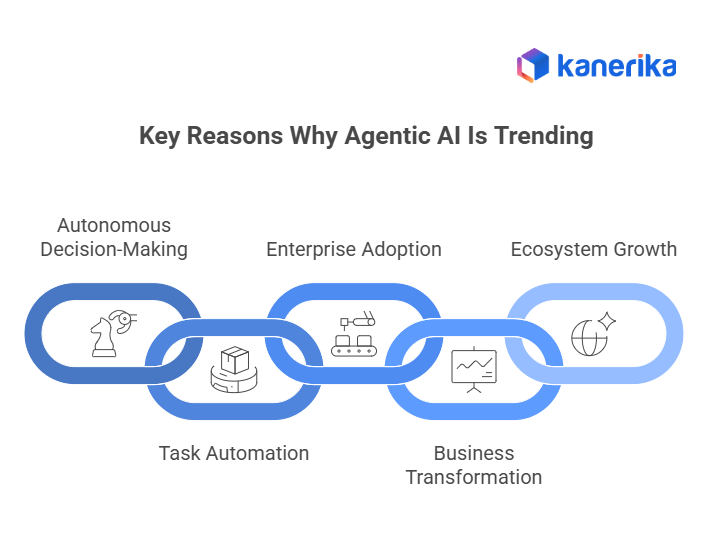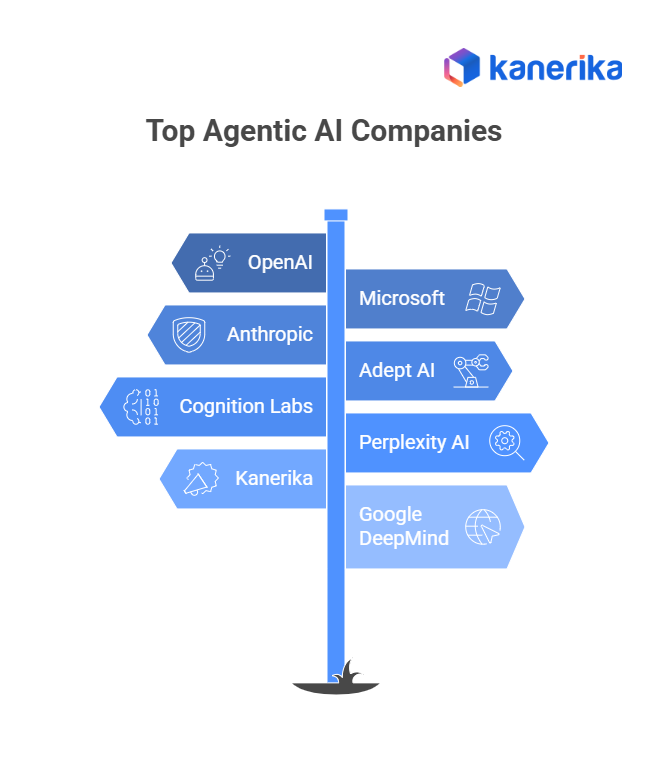As Satya Nadella, CEO of Microsoft, remarked, “AI agents are replacing segments of knowledge work.” This shift is clear in JPMorgan Chase’s deployment of compliance AI agents to automate Know Your Customer (KYC) and Anti-Money Laundering (AML) processes. By integrating agentic AI, JPMorgan has greatly reduced manual workloads, enabling compliance teams to focus on more complex tasks. Furthermore, this real-world application shows how agentic AI companies are transforming traditional workflows into autonomous, efficient systems.
According to a 2025 report, the global agentic AI market is projected to grow from $7.38 billion in 2025 to $47 billion by 2030, with a CAGR of 44.8%. Meanwhile, enterprises across various sectors are adopting agentic AI for tasks such as customer service, data analysis, and workflow automation, reflecting the growing reliance on autonomous AI systems.
In this blog, we’ll explore leading agentic AI companies, the solutions they offer, and how these autonomous systems are being applied in real-world scenarios.
KeyTakeaways
- Agentic AI lets systems make decisions and act autonomously, improving efficiency.
- Leading agentic AI companies include OpenAI, Microsoft, Anthropic, Adept AI, Cognition Labs, Perplexity AI, Kanerika, and Google DeepMind.
- Kanerika provides enterprise AI agents for secure, scalable automation of data, workflows, and compliance tasks.
- Choosing the right provider depends on expertise, integration, security, scalability, and ethical AI practices.
- Businesses adopting agentic AI can reduce manual work, improve accuracy, and speed up decision-making.
Boost Your Business Efficiency with Intelligent AI Solutions!
Partner with Kanerika for Expert AI implementation Services
What Is Agentic AI and Why Are People Talking About It?
Agentic AI is a new class of artificial intelligence that goes beyond simple automation. Unlike traditional AI, which waits for instructions, agentic AI can make decisions, plan tasks, and act independently. In essence, it’s designed to work more like a digital teammate than a tool.
This shift is gaining attention because businesses are seeking smarter, more proactive systems that automate manual tasks and enhance efficiency. As a result, with the rise of AI agents that can handle complex workflows, the demand for agentic AI platforms is growing fast.

Key Reasons Why Agentic AI Is Trending
1. Autonomous decision-making
These AI systems can assess situations, set goals, and take action without constant human input.
2. Task automation at scale
From managing emails to running data pipelines, agentic AI can handle repetitive tasks across departments.
3. Enterprise adoption
Companies are integrating agentic AI into operations, customer service, and software development to cut costs and boost productivity.
4. AI-powered business transformation
Agentic AI is helping businesses move from reactive support to proactive execution, changing how teams work.
5. Growing ecosystem of agentic AI tools
Platforms like OpenAI, Microsoft Copilot, and Kanerika’s enterprise agents are making it easier to deploy these systems in real-world environments.
Which Companies Are Leading in Agentic AI?
Agentic AI companies are transforming automation by creating systems that can think, plan, and act independently. In fact, these advanced AI agents go beyond basic automation to handle complex tasks with minimal human input. Below are the top 8 agentic AI companies leading this new wave of innovation.
1. OpenAI – GPT Agents and Autonomous AI Tools
OpenAI has become a global benchmark for Agentic AI innovation through its GPT models, which now act as intelligent digital agents. These models can understand instructions, plan multi-step workflows, and connect with external tools to perform real-world actions. For example, from creating marketing campaigns to analyzing financial reports, OpenAI’s technology allows automation with human-like reasoning. Moreover, its “custom GPTs” and API integrations are being used by enterprises to build domain-specific AI assistants that handle support, analytics, and decision-making on their own.
Key Highlights:
- GPT agents perform end-to-end automation
- Connects with APIs and external tools
- Builds domain-specific intelligent assistants
Partner with Kanerika to Modernize Your Enterprise Operations with High-Impact Data & AI Solutions
2. Microsoft – Copilot, AutoGen, and Azure AI
Microsoft’s approach to Agentic AI focuses on productivity and enterprise transformation. Its flagship products, like Copilot in Microsoft 365, act as real-time assistants that help professionals summarize data, write documents, and analyze insights. Additionally, with AutoGen, Microsoft enables developers to create multi-agent systems that work together and complete tasks automatically. Additionally, backed by Azure AI Studio, these capabilities are available at scale across various industries.
Key Highlights:
- Copilot enables task automation in real time
- AutoGen powers multi-agent collaboration
- Azure AI supports secure enterprise deployments
3. Anthropic – Claude AI and Ethical AI Framework
Anthropic is pioneering “constitutional AI,” where systems follow clearly defined ethical guidelines. Its Claude AI models are designed for safe, clear, and responsible reasoning. Businesses use Claude to summarize large documents, answer complex questions, and make recommendations while ensuring transparency and fairness. As a result, Anthropic’s focus on ethical intelligence makes it a trusted name for AI deployments in regulated sectors.
Key Highlights:
- Uses constitutional AI principles
- Delivers clear and ethical automation
- Ideal for compliance-driven industries
4. Adept AI – ACT-1 for Software Task Automation
Adept AI’s ACT-1 (Action Transformer) stands out for its ability to perform natural, language-based task automation. It can interact with web and software interfaces, clicking, typing, and moving around just like a human. This innovation allows employees to hand off routine operations such as form-filling, data entry, or CRM updates to AI. Ultimately, Adept’s mission is to bridge human intent and machine action through easy-to-use interfaces.
Key Highlights:
- Performs multi-step actions using natural language
- Runs tasks directly on software interfaces
- Reduces manual workloads across business systems
5. Cognition Labs – Devin, the AI Software Engineer
Cognition Labs made headlines with Devin, the world’s first autonomous AI software engineer. Devin can read project briefs, write and debug code, and deploy applications without direct supervision. In addition, it works across tools like GitHub and VS Code, acting as a full development assistant. This is a breakthrough in AI-powered software engineering, allowing teams to scale coding efficiency and speed up innovation.
Key Highlights:
- Writes and debugs code on its own
- Connects with real developer tools
- Boosts software development productivity
6. Perplexity AI – Comet for Web Intelligence
Perplexity AI has transformed how people interact with the web through Comet, its intelligent search and reasoning agent. Unlike traditional chatbots, Comet finds and interprets real-time information, helping users research, compare, and analyze data efficiently. Consequently, it’s widely used by professionals and researchers for fast, reliable, and conversational web exploration.
Key Highlights:
- Provides real-time search and analysis
- Offers factual, web-verified results
- Ideal for research and knowledge workflows
7. Kanerika – Data-Driven Agentic AI for Enterprise Workflows
Kanerika specializes in integrating Agentic AI into enterprise data ecosystems. Its intelligent agents handle data integration, analytics, and governance tasks on their own across hybrid cloud environments. By combining data fabric architecture with AI reasoning, Kanerika builds systems that clean, connect, and analyze data without constant human input. Therefore, this helps businesses improve decision-making speed, accuracy, and compliance while reducing operational costs.
Key Highlights:
- Automates data management and analytics
- Uses AI for governance and real-time decisions
- Supports secure, scalable enterprise AI adoption
8. Google DeepMind – Gemini and AI Reasoning Systems
Google DeepMind continues to lead in cognitive AI through its Gemini models, built to understand, plan, and handle multi-step reasoning tasks. These systems integrate text, code, and visual understanding, making them useful for a wide range of applications, from content creation to scientific research. Furthermore, DeepMind’s focus on multi-agent collaboration and reinforcement learning keeps it at the forefront of autonomous AI system development.
Key Highlights:
- Gemini models enable multi-modal reasoning
- Supports planning and goal-oriented tasks
- Connects across Google Cloud and Workspace

How to Choose an Agentic AI Provider for Your Business?
Choosing the right agentic AI company or provider can determine how well your organization uses automation and intelligence. The right platform depends on your goals, data ecosystem, and technical maturity. To help with this, here’s what to check before choosing an agentic AI partner:
1. Domain Expertise
Look for providers with experience in your sector, such as finance, retail, healthcare, or logistics. For instance, Kanerika specializes in enterprise AI and data automation, matching AI solutions with business outcomes.
2. Integration Capabilities
The best agentic AI platforms connect easily with your existing tools (CRM, ERP, or cloud infrastructure). Platforms like Microsoft Copilot and OpenAI’s GPT agents are known for their enterprise integration flexibility.
3. Security and Compliance
Make sure the provider offers data encryption, access control, and regulatory compliance (GDPR, SOC 2, HIPAA). In particular, security is critical when deploying autonomous systems at scale.
4. Scalability and Infrastructure Support
Agentic AI should handle both small pilots and enterprise-scale workloads. Providers like Anthropic and Kanerika offer scalable deployments using cloud-native architectures and APIs.
5. Transparency and Ethical AI
Check how the provider ensures fairness, clarity, and bias mitigation. Companies like Anthropic and Google DeepMind emphasize safety and responsible AI practices.
6. Customization and Ongoing Support
Choose a provider that allows fine-tuning, custom workflows, and continuous optimization rather than a one-size-fits-all model.
Example Use Case
A financial services company might choose Kanerika’s agentic AI framework for fraud detection and data analysis because it provides both secure integration with legacy systems and autonomous process optimization, improving decision speed and compliance tracking.
Partner with Kanerika to Modernize Your Enterprise Operations with High-Impact Data & AI Solutions
Kanerika: A Rising Leader Among Agentic AI Companies
Kanerika is emerging as one of the most innovative agentic AI companies, offering enterprise-ready AI agents that automate complex, repetitive, and high-risk tasks. With a strong foundation in data engineering and AI integration, Kanerika’s agentic systems are built to support real-time decision-making, compliance, and operational efficiency across industries.
What makes Kanerika stand out is its focus on customizable AI agents that are tailored to specific business functions. In turn, these agents are designed to work within existing enterprise systems, making them easy to deploy and scale.
Kanerika’s Agentic AI Agents Include:
- Alan – Summarizes long legal documents into short, customizable formats, saving time for legal and compliance teams
- Susan – Removes sensitive PII from documents to meet global privacy regulations like GDPR and HIPAA
- Mike – Checks documents for arithmetic errors and consistency, helping finance and audit teams reduce manual review time
- Karl – Answers data-related questions in plain English, turning complex queries into instant, actionable insights
- Jarvis – Supports internal IT teams by sorting support tickets and suggesting solutions, improving response times
- Jennifer – Handles voice-based scheduling, meeting coordination, and call assistance, streamlining executive workflows
Why Kanerika Is Trusted by Enterprises
- Built for scale and security
Kanerika’s agentic AI systems are compliant with ISO 27701, SOC 2, and GDPR standards. - Industry-focused
Solutions are tailored for healthcare, logistics, finance, and retail - Easy integration
Agents plug into existing data pipelines, CRMs, ERPs, and cloud platforms - Real-world impact
Proven to reduce manual effort, improve accuracy, and speed up decision-making
For businesses exploring agentic AI platforms, Kanerika offers a practical, secure, and scalable path to automation—making it a strong contender among top agentic AI companies.
Elevate Organizational Productivity by Integrating Agentic AI!
Partner with Kanerika for Expert AI implementation Services
FAQs
What are agentic AI companies?
Agentic AI companies develop intelligent systems that can plan, make decisions, and act independently, automating complex business tasks with minimal human intervention.
Which are the top agentic AI companies in 2025?
The leading players include OpenAI, Microsoft, Anthropic, Adept AI, Cognition Labs, Perplexity AI, Kanerika, and Google DeepMind, each offering unique autonomous AI solutions.
How do agentic AI companies help businesses?
They automate workflows like customer support, data analysis, compliance checks, and reporting, reducing manual effort, increasing speed, and improving accuracy.
Which industries benefit most from agentic AI?
Finance, healthcare, retail, logistics, and technology sectors see the biggest impact, especially where real-time decision-making and data-driven automation are crucial.
How to choose the right agentic AI provider?
Evaluate providers based on industry expertise, system integration capabilities, data security, scalability, ethical AI practices, and flexibility for custom workflows.










